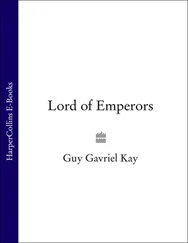After three or four cups of rice wine, their honourable teacher had sometimes begun reciting poems or singing sad songs about the Xiaolu’s conquest of the Fourteen Prefectures two hundred years ago— the Lost Fourteen— the lands below the ruins of the Long Wall in the north. The wall was a meaningless thing now, he told his pupils, wolves running through it, sheep grazing back and forth. The songs he sang distilled a heart-torn longing. For there, in those lost lands, lay the surrendered soul of Kitai.
So the songs went, though they were dangerous.
Wang Fuyin, sub-prefect in that same town of Shengdu, Honglin prefecture, Szechen province, in the twenty-seventh year of the reign of Emperor Wenzong of the Twelfth Dynasty, was rendered more unhappy, later that morning, than he could express.
He was not diffident about expressing himself (unless he was reporting to the prefect, who was from a very good family and intimidated him). But the information that had just arrived was so unwelcome, and so unambiguous in what it demanded of him, that he was left speechless. There was no one around to abuse, in any case—which was, in fact, the essence of the problem.
When someone came to any yamen in Kitai from any village bringing an allegation of murder, the sequence of actions to be followed by the civil administration at that yamen was as detailed as anything could be in a famously rigid bureaucracy.
The sub-prefecture sheriff would leave for the village in question with five bowmen to protect him and keep order in what might turn out to be an unruly location. He would investigate and report. He was obliged to set out the same day if word reached the yamen before midday, or at dawn the next morning if otherwise. Bodies decomposed rapidly, suspects fled, evidence could disappear.
If the sheriff should be elsewhere engaged when such a message arrived (he was, today), the judicial magistrate was to go himself to investigate, with the five bowmen and within the same time constraints.
If the magistrate, for whatever reason, was also absent or indisposed (he was), the sub-prefect was tasked with the immediate journey and inquiry, including any inquest required.
That, alas, meant Wang Fuyin.
No lack of clarity in the regulations. Failure to comply could mean strokes with the heavy rod, demotion in rank, even dismissal from civil office if your superiors disliked you and were looking for an excuse.
Civil office was what you dreamed of after passing the jinshi examinations. Being given a sub-prefect’s position, even in a far western wilderness, was a step, an important step, on a road that might lead back to Hanjin, and power.
You didn’t want to fail in something like this, or in anything. It was so easy to fail. You might pick the wrong faction to align with, or have the wrong friends at a viciously divided court. Sub-prefect Wang Fuyin had no friends at court yet, of course.
There were three clerks at the yamen this morning, filing, reading correspondence, adding up tax ledgers. Local men, all of them. And all of them would have seen a miserable, frightened peasant arrive on his donkey, muddy and wet, before midday, then heard him speak of a man slain in Guan Family Village—most of a day’s long, awkward, dangerous ride east towards the Twelve Peaks.
Probably more than a day, Wang Fuyin thought: which meant staying overnight along the way in some sodden, flea-and-rat-infested hovel without a floor, animals kept inside, a handful of bad rice for his meal, rancid wine or no wine, thin tea, while tigers and bandits roared in the cold night.
Well, bandits were unlikely to roar, Fuyin corrected himself (a fussy, precise man), but even so …
He looked at the pale, emerging sun. It had rained lightly overnight, third night in a row, thank the gods, but it was turning into a mild autumn day. It was also, undeniably, still morning, and the clerks would know the protocols.
The sheriff had gone north two days ago to deal with taxation arrears towards the hill passes. Sometimes a chancy exercise. He had taken eight bowmen. He was supposed to have five, but he was a cowardly man (in Wang Fuyin’s view), and though he’d claim he was training the newer ones, he was just increasing his own protection. In addition to farmers unhappy about taxes, bandits in the west country were endemic. Bandits were everywhere in Kitai, really, and there were always more in times of hardship. There existed texts on how to deal with outlaws (Fuyin had read some on the long journey west), but since arriving, he’d decided the texts were useless. You needed soldiers and horses and good information. None of these were ever present.
Neither was the judicial magistrate, Wang Fuyin sometimes felt.
Having taken his own escort of five bowmen, their honourable magistrate was on his monthly three-day “retreat” at the nearby Five Thunder Abbey of the Sacred Path, seeking spiritual enlightenment.
It seemed that he had negotiated this privilege from the prefect (Wang Fuyin had no idea how) years before. What Fuyin knew, having arranged to know it, was that the magistrate’s path to enlightenment consisted mainly of time spent among the women (or one particular woman) at the convent adjacent to the abbey.
Fuyin was extremely jealous. His wife, from a better family than his own and not shy about reminding him, had been deeply unhappy to be posted here. She’d made him aware of that on the journey, and on a daily basis since they’d arrived a year ago, her words like the tedious dripping of rainwater from the eaves of their small house.
The one singing-girl place in Shengdu was dismally unpalatable for a man who had known the best houses in the pleasure district of the capital. Wang Fuyin didn’t make nearly enough money to afford a concubine, and had yet to figure out how to arrange his own spiritual retreats to the convent by the Five Thunder Abbey.
It was a hard life he lived.
The village messenger, he saw, had led his donkey to the water trough in the space in front of the yamen and was letting it drink. He was also drinking himself, head down beside the donkey’s. Wang Fuyin kept his face impassive, fastidiously adjusted the sleeves and collar of his robe, and strode into the yamen .
“How many bowmen are still here?” he asked the senior clerk.
Ren Yuan stood up (his manners were very good) and bowed before replying. Local clerks were not “in the current,” not true civil servants. As recently as twenty years ago, before the reforms, they’d been unpaid, reporting to a yamen for two-year terms, drafted from among the two highest ranks of local farmers and villagers.
That had changed with the “New Policies” of Prime Minister Hang Dejin—over considerable opposition. And that had been just one part of a conflict at court that was still destroying and exiling people. In some respects, the subversive thought occasionally came to Wang Fuyin, it wasn’t so bad to be out of the way in the west just now. One could drown in the current in Hanjin these days.
“Three bowmen are with us at the moment, honourable sir,” his senior clerk said.
“Well, I need five,” said the sub-prefect coldly.
“You are permitted to go with four. It is in the regulation. When necessity requires and so on. You just file a report.”
That was his junior taxation clerk. He didn’t stand up. Fuyin didn’t like him.
“I know that,” he said (he’d forgotten, actually). “But we only have three, so that doesn’t help very much, does it, Lo Fong?”
The three clerks just looked at him. Pale sunlight came into the yamen through the open windows and doors. It had become a lovely autumn morning. Wang Fuyin felt like beating someone with a rod.
Читать дальше












